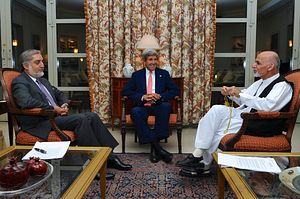While security continues to dominate the news on Afghanistan, the long-running political crisis in this war-ravaged country is about to take a turn for the worse. As the National Unity Government (NUG) is nearing the two-year completion of its term, it is confronted with serious political deadlock and a constitutional crisis. The future of the incumbent government hinges on how it will handle the unfolding situation. A mishandling of the crisis can prove to be detrimental for Kabul’s incipient democratic process and political cohesion.
The two year power sharing deal midwifed by U.S. Secretary of State John Kerry in September 2014 between President Ashraf Ghani and the Chief Executive Officer (CEO) Dr. Abdullah Abdullah will expire on September 30. As per the terms of the agreement, the NUG was required to introduce a number political and electoral reforms within two years to pave way for parliamentary elections, followed by the convening of a constitutional Loya Jirga (grand assembly of the tribal elders) to amend the constitution to transform the CEO’s office into the office of the prime minister. However, given the dysfunctional nature of the NUG, the Ghani-Abdullah duo has not been able to honor its commitments. In light of the above, the political future of the NUG remains uncertain beyond September. If the needed constitutional amendments are not introduced, which look next to impossible at this time, it could create a split between the two leaders.
The political bickering and differences between Ghani and Abdullah are an open secret. However, the situation took an ugly turn last month when the CEO publicly criticized the president in a press conference. Abdullah censured Ghani for not meeting him for the last three months and declared him unfit to run the country. Abdullah’s tone became particularly harsher toward Ghani when the latter unilaterally nominated Ahmed Yousuf Nuristani as head of the Independent Election Commission of Afghanistan and Nader Naderi as chairman of the Public Service Commission. Ghani responded by calling Abdullah irresponsible and accused him of violating the spirit of governance.
Ahead of the approaching deadline, Abdullah and his supporters are demanding political concessions, financial incentives, and a greater share in key ministries in exchange for future support and cooperation. They are also asking Ghani to give up his centralized style of ruling along with relinquishing micro-management of things. They feel side-lined from the decision-making process.
Arguably, Ghani’s unaccommodating nature and his bureaucratic style of governance stem from his weak political background and previous career as an international development expert. He does not come from a political family in Afghanistan and he is unaware of the local dynamics and intricacies of the ethnic and tribal politics of Afghanistan. Both his opponents and allies consider him as a technocrat rather than a politician. Ghani’s weak political credentials and absence of a local constituency isolate him in the context of local Afghan politics. On a lighter note, he has the reputation of one who lectures his ministers rather than listening to their complaints and solving their problems.
Against this backdrop, three political alliances of the opposition groups have come up, which are jockeying for political mileage or even replacing the NUG. The first opposition group is that of former President Hamid Karzai who, despite peacefully handing over power to Ashraf Ghani in 2014, remains politically active. Karzai sees himself as the savior of modern Afghanistan and indispensable to country’s future survival and stability. He has been a vocal critic of the NUG’s different policies, especially Ghani’s pivot to Pakistan. Ahead of the September deadline, Karzai has been holding hectic meetings with his political supporters, important tribal elders, and key political figures, apparently to manipulate the outcome of the Loya Jirga. Many believe he hopes to return to power as the head of a transition national government by replacing the current setup if the decision of the Loya Jirga goes against the NUG and a political deadlock ensues.
With Karzai allegedly trying to influence and manipulate the outcome of Loya Jirga, many cite this as another reason for the delay and government’s reluctance to convene the Loya Jirga. The government is nervous and skeptical of Karzai’s ambitions and his busy political schedule.
The second group comprises Abdullah’s supporters, which include powerful warlords and key figures of the northern alliance group, such as commander Ismail Khan, the former governor of western Herat province; Atta Muhammad Noor, the governor of northern Balkh province; and Amrullah Saleh, the former Afghan spy chief. Along with demanding political and financial concessions mentioned above, this group has raised its own armed militias, parallel to Afghan security forces, to fight the Taliban and defend their areas showing a deep mistrust in the capabilities of the Afghan forces.
The third opposition group—the Afghanistan Protection and Security Council—has been formed by former Pashtun warlord Abdul Rasool Sayyaf. This group is more like an opportunistic pressure group rather than a real power contender. It is pressurizing the Kabul government to fulfill its promises and honor commitments regarding anti-corruption, reforming the election commission, and holding the parliamentary elections. It hopes to extract political favors from Ghani if the Ghani-Abdullah alliance breaks down and Ghani needs new political allies.
Afghanistan needs a fresh political agreement so that the current dispensation can complete its five year term and focus on more pressing issues of security, economy, and governance. If a pragmatic solution is not found within the next two weeks, it will seriously undermine the legitimacy of the NUG. A political meltdown will be a huge setback for the common Afghans who defied all odds and risked their lives by coming out to vote in the 2014 presidential elections and kept democracy on track in Afghanistan.
Abdul Basit is an Associate Research Fellow at the S. Rajaratnam School of International Studies (RSIS), Singapore.

































